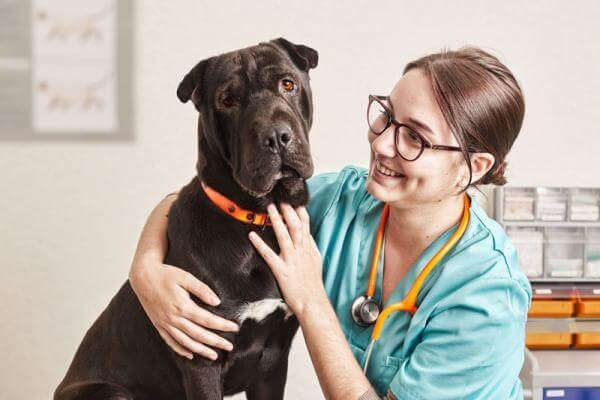Just like people, dogs may also suffer from allergies. Allergies involve an abnormal response from their immune systems in response to specific substances – whether pollen, food or anything inhaled or consumed.
CALIFORNIA, UNITED STATES | NOW THEN DIGITAL — Dogs can be allergic to various substances, including food, flea saliva, prescription drugs, perfumes, cleaning products, shampoo, certain fabrics, and plastic.
Here are five signs to watch out for if you suspect your dog is having an allergic reaction:
- Itchiness: A common manifestation of allergies in pets, itchiness can be localized or generalized, with common areas affected being the paws, ears, and face.
- Hives: Redness on the skin, commonly known as hives, is another sign of an allergic reaction.
- Swelling: Allergic reactions can cause areas to become swollen, often itchy, and prompt a pet to scratch or rub its face.
- Gastrointestinal symptoms: Food allergies can cause diarrhea, vomiting, and other gastrointestinal symptoms in dogs.
- Red eyes: Redness of the eyes can be a sign of an allergic reaction in dogs.

It is important to note that any food ingredient can potentially cause an allergic reaction in dogs, and that individual dogs may have unique sensitivities. If you suspect that your dog may have an allergy, it is important to work with your veterinarian to identify the specific allergen and develop an appropriate treatment plan.
Itching
If your dog is scratching excessively or itching across their entire body or showing symptoms of hives, they should see their veterinarian immediately as this could indicate an allergic reaction that could potentially become life-threatening if left untreated.
It could be caused by insect bites or stings, food allergies, or something in their food, among many other things. A veterinarian will likely suggest conducting a diet trial to isolate any problematic ingredients.
If itching is accompanied by facial swelling, vomiting, trouble breathing, a weak pulse or seizures it should be treated as an emergency and an urgent call should be made to an emergency veterinarian immediately.
They will administer an injection that stops an allergic reaction dead in its tracks as well as instructions for future reactions as well as possibly prescribing medicine to ease itching such as steroids or antihistamines.
Swelling
Swelling may be a telltale sign that your dog is experiencing an allergic reaction, with symptoms including face swelling, skin hives and itching becoming apparent over time. Should any such signs arise it is essential that you contact a vet as soon as possible rather than waiting until they fade on their own.
Hives, also known as raised red bumps on the skin, are common among short-furred dogs. Though more apparent among short-furred breeds, long-haired breeds can also exhibit symptoms.
As these bumps can often be itchy, they often prompt your pet to bite at or chew at affected areas until breaking through and leading to infection.
Swelling may also be a telltale sign of serious allergies in dogs, such as anaphylaxis.
This occurs when their immune system overreacts to allergens and closes off their airways preventing breathing; an emergency situation that requires immediate medical care – often including administration of epinephrine injection.
Vomiting
Your dog could experience an allergic reaction that impacts its gastrointestinal system and causes vomiting. Typically this reaction is related to something they have eaten or taken, like new food or medications or toxin exposure.
Your pet could also experience less severe forms of an allergic reaction that does not involve their digestive tract and includes symptoms like chronic itching and stomach discomfort. These allergies typically develop after repeated exposure to allergens over a prolonged period.
If your dog has runny eyes or is itching his skin regularly or seemingly nonstop around its ears and face, this could indicate an allergic reaction requiring medical intervention from a veterinary dermatologist.
Any discoloration to their gums such as blue, blood red or black indicates serious allergic reaction requiring immediate veterinary assistance from Highland or Westville emergency vets.
Sneezing
Dogs sneeze for various reasons, making it hard to determine whether your pup requires medical treatment. If they seem to sneeze regularly or if there are additional symptoms that appear with it, it might be worth consulting your veterinarian about treatment.
Sneezing dogs often occur because their nasal passages have become irritated due to inhaling something that has made their sinuses congest, such as dust particles or grass debris clogging up their nose or even insects causing infections.
They could also be sneezing due to excitement; this type of sneeze can be taken as an indicator that they are playing with you or other dogs, and wrestling. Sometimes they will even sneeze to indicate they aren’t being aggressive!
Sneezing that produces blood or mucus should always be treated as cause for alarm, as it could indicate your dog has either a nasal infection or nasal mites, which are known to affect any age, breed or sexe of dog and can spread via nose-to-nose contact between animals.
Common Allergens That Dogs Can React To
Dogs can be allergic to a variety of substances, with some of the most common allergens including proteins in food such as beef, chicken, lamb, fish, dairy, soy, and wheat gluten, environmental allergens like pollen, grasses, weeds, molds, and house dust mites, flea saliva, and contact allergens like pyrethrins found in flea collars, pesticides, and certain materials like wool or synthetics used in carpets or bedding.
How to Identify if a Dog Has a Food Allergy

Identifying food allergies in dogs can be challenging, but according to the American Kennel Club, common signs include gastrointestinal symptoms like diarrhea and vomiting, dermatologic signs like poor skin or itchy coat, and chronic ear or foot infections.
Food allergies can cause skin reactions in dogs such as itching, redness, and inflammation.
The most common food allergens in dogs are proteins, especially those from dairy, beef, chicken, chicken eggs, soy, or wheat gluten. A food trial may be recommended by a veterinarian to diagnose food allergies in dogs.
Preventing Allergic Reactions in Dogs
To prevent allergic reactions in dogs, pet owners should monitor their dogs while outside and avoid suddenly switching products used to clean the dog’s bedding and sleeping area.
Pet owners should work with a veterinarian to develop a treatment plan, which may include medications, hypoallergenic diets, and immunotherapy.
If a pet owner suspects their dog is having an allergic reaction, they should seek veterinary attention immediately.
Long-Term Effects of Untreated Allergies in Dogs

Untreated allergies in dogs can cause short-term discomfort and pain, such as itching, inflammation, hives, excessive paw-licking, scratching, and hair loss.
In the long term, untreated allergies can lead to chronic skin and ear infections and cause behavioral changes in dogs, such as aggression, anxiety, and depression.
Working with a veterinarian to diagnose and treat allergies in dogs is crucial in preventing these short-term and long-term effects.
Editor’s Note: We would appreciate it if you could let us know if any of our content is inaccurate or outdated at press@nowthendigital.com.

















